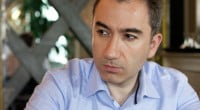Are ambassadors propaganda officials for the ruling party?

Date posted: January 21, 2014
ALİ H. ASLAN
After Prime Minister Recep Tayyip Erdoğan ordered Turkish ambassadors to explain to foreign diplomats the recent graft and bribery scandal from a conspiracy-oriented and partisan perspective, the Turkish ambassador to Washington will certainly have the hardest time complying with this instruction.
Indeed, he will have American officials who are uneasy with the Turkish government implying the involvement of the US in a so-called “coup” attempt against it. And if the ambassador blames the Hizmet movement, which is the most active and influential Turkish civil society movement in the US, this will amount to the Turkish government cutting off its own nose. Turks don’t need the Armenian lobby to defame Turkey; the Turkish Republic is already undermining the Turkish lobby. And it is doing this ahead of the great Armenian campaign in 2015. Well done!
Excluding its do-not-pull-us-into-this-issue approach regarding the Dec. 17 process, the US has not really raised its voice about the anti-democratic practices but this does not mean that it endorses the Turkish government’s attitude. Rather, the concerns about the developments on the Turkish domestic front have peaked. US official do not publicly send harsh messages as they don’t want to directly confront the Turkish government and the broad masses supporting it. They are worried about potential threats to US interests. On the other hand, the amount of criticisms targeting the Turkish government is increasingly noticeable in the remarks made by government spokespeople. White House spokespeople were initially passing off questions about the developments in Turkey as a “domestic matter” but have recently started to politely refer to basic principles such as “no one is above the law.”
I don’t believe in private talks; US officials still strongly advise their Turkish counterparts to stick to the rule of law. Rather, they focus on more technical matters. This includes the latest Paris meeting between Turkish Foreign Minister Ahmet Davutoğlu and US Secretary of State John Kerry. It appears that during this meeting, Kerry had asked Davutoğlu to declare that the US is not involved in the recent crisis. But as Davutoğlu didn’t mention it during the joint press conference, Kerry had to say: “Well, thank you very much, Ahmet. I don’t know if you want to say anything about our conversation briefly on the subject of Turkey-U.S. and the internal politics. Or do you want me to do that?”
US attitude depends on election results
It is quite normal for Kerry not to put Davutoğlu in a difficult position with his criticisms as Kerry seeks Davutoğlu’s support in the Palestinian-Israeli peace process and the Syrian crisis. He wouldn’t want to allow their personal relations to worsen either. Yet the overall mood in the US foreign bureaucracy, especially in the White House, regarding the Turkish government’s recent performance is quite negative.
The Center for American Progress (CAP), a think tank closer to US President Barack Obama, has been telling the White House to exert pressure on the Erdoğan administration, urging it to respect democracy, human rights and the rule of law. However, given the fact that the ice between the US and Tehran is thawing, the US is signaling it might make a deal with the Bashar al-Assad regime and that it is working with the Egyptian army, it is very unlikely for Obama to abandon his realistic and pragmatic policy. Moreover, from a US perspective, Turkey is performing better than other regimes in the region from a democratic and economic standpoint. (It is sad for Turkey to be compared to Middle Eastern countries rather than European countries). The US administration’s strategy is to keep its nose clean and wait to see the Turkish election results on March 30 and revise its strategy depending on the results. This means that if Erdoğan’s electoral support is weakened, the US may step up its criticisms.
“If Turkey’s ambassador to Washington acts in compliance with Erdoğan’s orders and conveys the government’s criticisms about the Hizmet movement in the recent graft scandal to US officials, what will be the officials’ reactions?” I asked an expert from a US think tank. “They would think the prime minister is in a great state of helplessness,” he replied. In such a situation, they perceive the problem to lie with the government rather than with the ambassador who relays the message. And this will be perceived as a great failure in Erdoğan’s democratic qualities.
Those who order ambassadors to put their citizens abroad in a difficult position in violation of human rights and national interests do not understand this: The international community is more concerned about whether the government sticks to democratic principles and the rule of law and less about who triggered the recent political crisis. The government had failed this test in connection to the Gezi Park protests. It failed again regarding the Dec. 17 process. Foreign countries may tolerate weaknesses such as corruption or fraud in their business partners to a certain extent as such problems can be seen in any country. The real problem is the leadership mentality that exacerbates crises beyond settlement. At that point, foreign leaders will start asking: “To what extent can we rely on and cooperate with such a leader? Can we trust him?”
Decline of Erdoğan and the AK Party
The arguments made during meetings held by various think tanks with diverse ideological leanings in Washington in the past two weeks have revealed the level of loss of confidence in the Justice and Development Party (AK Party). All the distinguished experts speaking at events organized by the Woodrow Wilson International Center, the Johns Hopkins University School of Advanced International Studies (SAIS), the Carnegie Institute and the Rethink Institute agreed that the US no longer sees the AK Party as a role model for political movements in the Middle East. They added that it is very likely that Turkey might lose its role model status in the region. Currently, it is virtually impossible to find an analyst who supports the AK Party and the prime minister’s hawkish attitude. What a catastrophic end for a political movement which has helped Turkey make significant progress in the last 11 years and for its leader!
My piece of advice to Prime Minister Erdoğan is to stop sending messages to Washington via the Turkish ambassador, but to directly call President Obama and tell him about the “coup” which he claims the US is involved in. Of course, he can do this if he can get an appointment with Obama, with whom he cannot speak on the phone since last summer… Certain AK Party officials who bombard their US friends with e-mails should visit Washington and boldly attend the meetings of think tanks. It is not elegant to try to cover up the corruption claims by hiding behind the respectability of ambassadors. Honorable diplomats of the Turkish Republic are not propaganda officials for any political party. The AK Party has emptied the judiciary of essence. What is next: diplomacy?
Source: Todays Zaman , January 20, 2014
Tags: Defamation of Hizmet | Democracy | Hizmet and politics | Turkey |
























